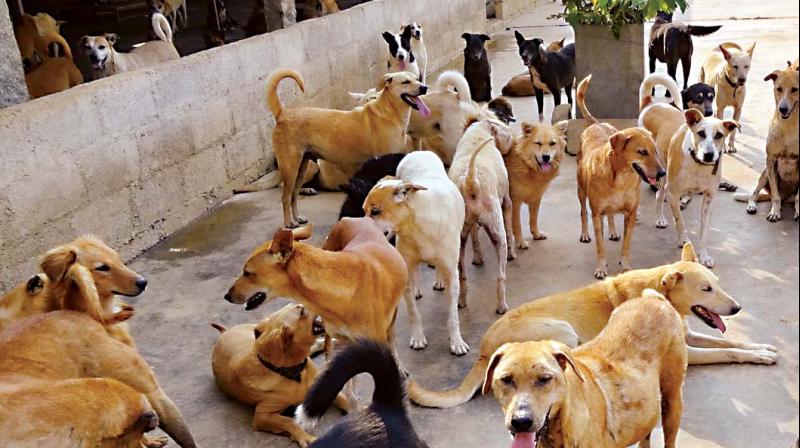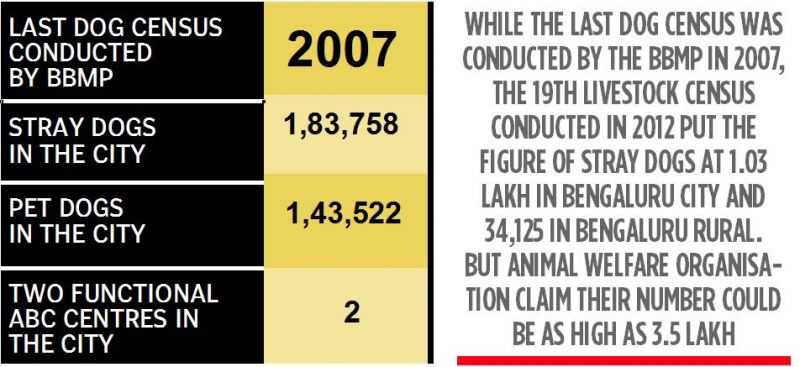Neutering has failed, time for a tough call?
The Bengaluru's festering garbage problem has made waste dumps a favourite haunt for dogs.

In Bengaluru, the stray dog menace is all pervasive and those travelling by two-wheelers or walking on the road during the night have to bear the brunt. As animal birth control measures have failed miserably, they are multiplying at an alarming rate. The city’s festering garbage problem has made waste dumps a favourite haunt for dogs. While citizens call for more drastic measures like culling, animal rights activists blame the authorities for mishandling the problem.
“I was walking home with my son and as we were returning from Tirupati, we had a lot of luggage with us. It is just a half- a- kilometer stretch from the main road to our house. But one dog started barking and others joined in! There were about 15 dogs easily,” complains Ms Shanti D, a resident of Chamarajpet, angry at having to confront stray dogs every day in her locality.
But the complaint is not confined to this area, Thippasandra, Malleswaram or any other locality as stray dogs continue to multiply everywhere around the city, feeding on garbage dumps and rubbish from meat stalls. Not surprisingly, people are getting increasingly frustrated at having to deal with them.
“There are over 30 dogs here who move around in packs,” says Ms Asha Thomas of Murugeshpalya. “They attack people passing through the area at night and chew off the seats of parked two-wheelers. It happened to my friend’s scooter, which was parked outside my house. When we came out, we found the seat completely torn. We could not do anything as around 12 dogs were near the vehicle, growling at us. If this isn’t menacing what is?” she asks angrily.
Some fed up Bengalureans are calling for euthanising the dogs, but with the Supreme Court ruling that only the rabid and terminally ill can be culled, this is not the solution. “If this is so, then the BBMP must set up dog pounds and take care of the dogs there,”says an angry resident of Malleswaram.
While the BBMP does have an Animal Birth Control programme to check the population of strays in the city, the many stray puppies found on the roads is an indication of how poorly it is implemented.
Even worse, the bitches with their litter often turn ferocious and attack passersby to protect their young ones or begin howling late in the night, disturbing people trying to get a good night’s rest.
“The BBMPs programmes like Catch Neuter Vaccinate and Release (CNVR) have failed to maintain consistency. They were run for a limited period and the agencies engaged abandoned the programme as they were not paid as agreed under the contract. Obviously, this has led to an increase in the stray dog population. Also, although the BBMP’s budget spoke about kennels, they seem to have remained on paper,” observe several residents of Thippasandra.
Stray dogs attack only when threatened: Activists
While people continue to complain about stray dogs in the city, animal rights activists claim they are not harmful and only get violent if threatened.
“People have this idea that dogs are dirty and will infect them and their children. As they are not all neutered, they multiply and develop tumours, mange, scabies and rabies, scaring them,” says Mr Toni of Haven Animal Trust.
Mr Vinay Moray, an animal welfare activist who works with the Sarvodaya ABC centre, blames the authorities for the growing population of the strays. "The dogs migrate in search of food and where do they find them? In the garbage dumps and on the street where people throw their leftovers. But still nothing is done about this," he regrets.
Many of the activists found the Catch Neuter Vaccinate and Release (CNVR) programme of the BBMP inhuman as it did not follow the rules on resting the strays and insisted that kennels be built to give them the care they needed after the procedure.
Left with little choice, the agency abandoned the programme. But now it is working to build the neccessary kennels, says its joint commissioner (animal husbandry) Dr. G. Anand.
“We have two functional kennels in Bommanahalli and four more are being built in the East zone and in the Yelahanka zone. Once they are completed we will resume the Animal Birth Control programme. In other zones, the tender has received a poor response and so we will float it a second time. Under ABC the dogs need to be rested for a day after they are caught and again for four days once they are neutered and vaccinated to ensure that they are in good health. This requires kennels. Once they are built, we will be able to curb the stray dog menace,” he assures.
With ABC, this problem won’t exist at all: Santosh Rajashekar
In today’s time when the city is full of traffic in the day, dogs are more active in the night. Dogs might chase vehicles when they enter their territory but do remember that when we slow down, dogs tend to lose interest and ward off.
The wrong thing to do is over speeding vehicles during night hours which will get you more attention and they end up chasing. But on the same lines dogs do alert when there are new people in your area at that time of the night, they are vigilant and the keep you safe.
Dogs are very friendly animals, so what you project is what you get back: Don't give them any reason to confront you. If the problem is speed, please slow down.
Avoid running over dogs, trying to throw stones, this makes them to retaliate. Friendly voice or even a stern voice in the night will do the trick. If you see a dog that is sure to bark on you, change your approach. Slow down and don’t speek off or do a zig zag drive.
ABC program had gap, BBMP has already resumed the program. We do need to accept that the city of Bangalore is growing. A city which had only 90 wards now has 198 wards.
It is the new areas where there was no programs earlier are being questioned, the only answer is to have the ABC program implemented. We have to remember that the ABC program is in support for us [ humans ], so lets make it successful.
BBMP has been one of the few offices which has been doing a great job when compared to other states for implementation of ABC programme and the results are quite evident, no outburst of populations in the older Bangalore, but may be some odd cases but it is the newer areas where we can concentrate on.
The focus should continue with ABC’s, where over the time these problems will be non-existent.
-The writer is honorary trustee of CUPA


